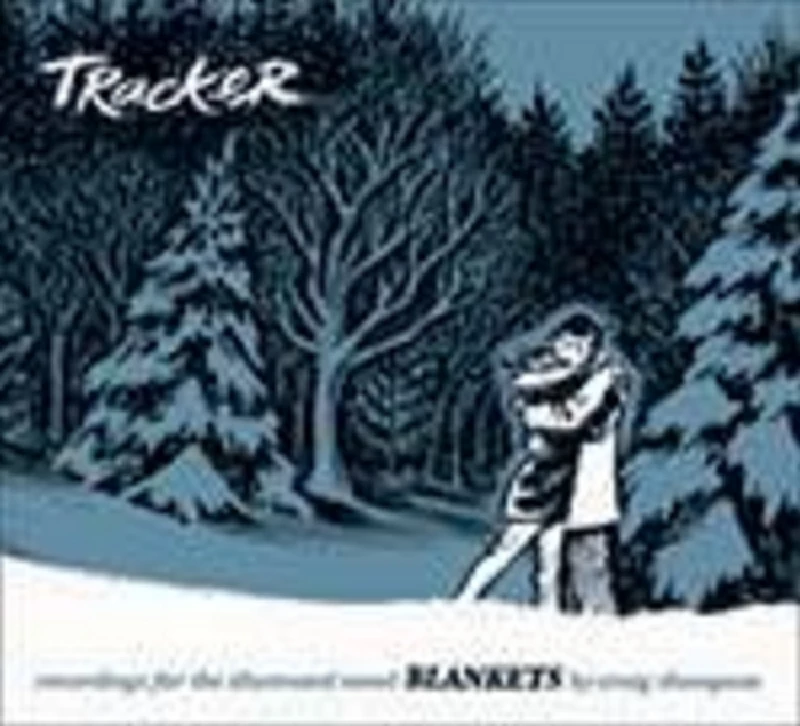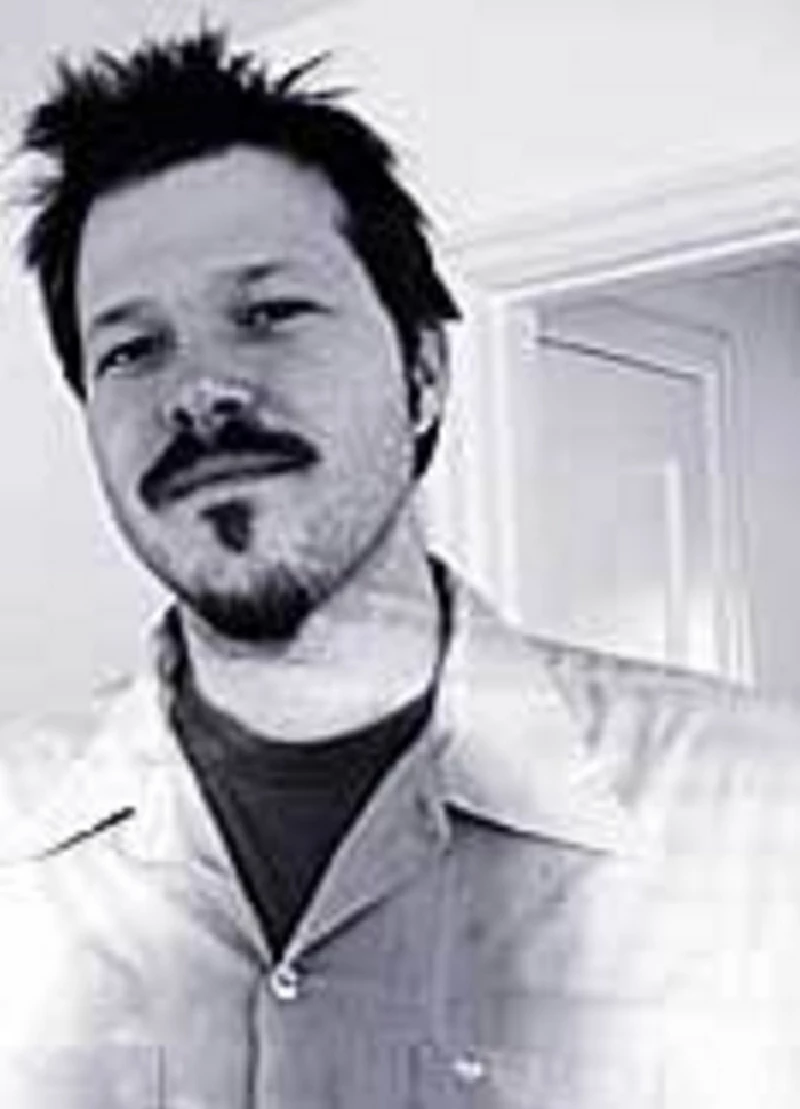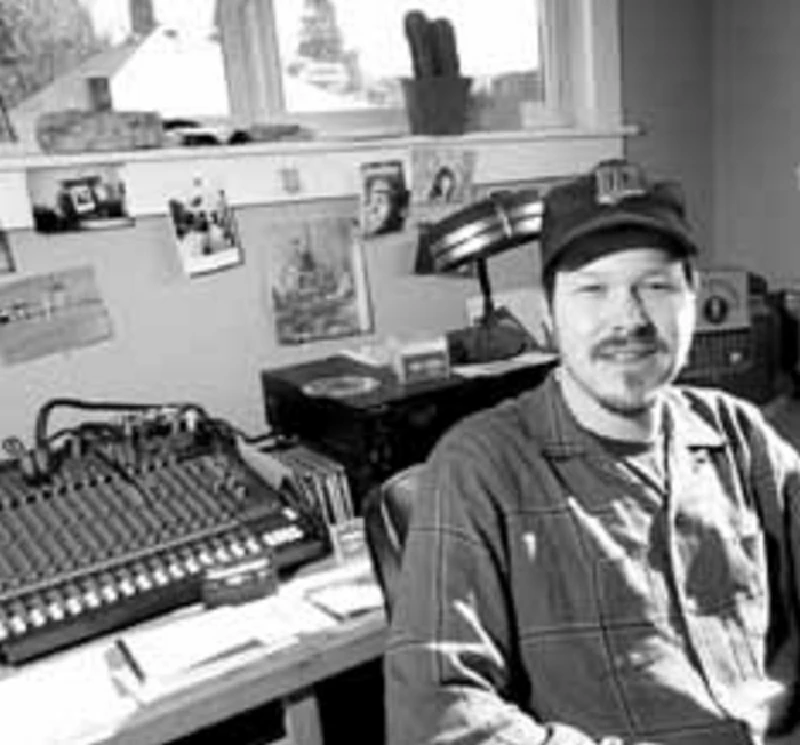Miscellaneous - Interview
by John Clarkson
published: 5 / 1 / 2005

intro
Portland, Oregon ensemble Tracker have recently released the soundtrack to Craig Thompson's much acclaimed autobiographical graphic novel 'Rewards.' Frontman John Askew speaks to John Clarkson about rewards and difficulties of recording it
‘Blankets’ is the second graphic novel of Portland, Oregon-based writer and illustrator, Craig Thompson. A sprawling, autobiographical tale of 580 pages, it tells of Thompson’s strictly fundamentalist childhood and upbringing ; his first love affair with Raina, a girl he meets at Christian camp, and his eventual loss of faith. ‘Blankets’ has the been the subject of much critical acclaim since its publication in 2003. Sparsely and elegantly drawn, winter and snow are dominant images, and it is an often dark work, but nevertheless concludes on a note of triumph and hope with Thompon’s emergence as a comic book artist. The specially commisioned soundtrack to the book is the latest album of the also Portland, Oregon-based ensemble,Tracker. The nom de plume for guitarist and songwriter John Askew, and a revolving cast of friends, Tracker have released two previous albums of desert and avant garde rock, ‘Ames’ (1999) and ‘Polk’ (2002), both of which Askew has released on his own flourishing label, FILM Guerrero. The soundtrack for ‘Blankets’, which was released in the United States at the end of last year and has now just come out in Britain, and which again has come out on FILM Guerrero, is more ambient in tone than its predessors, and combines quiet, introverted stretches with passages of turbulence and discordance. Entirely instrumental for ten out of its eleven tracks, it concludes with the album’s only vocal track, rustic folk number, ‘Everything is Beautiful’. Pennyblackmusic spoke to John Askew about the rewards and some of the difficulties of recording the ‘Blankets’ soundtrack. PB : How did you first become involved in writing the soundtrack for ‘Blankets’ ? JA : Craig Thompson and Brett Warnock, who owns Top Shelf Comics which published ‘Blankets’, approached me before I had actually read it. I didn’t know quite what I was getting into. Brett is a friend of mine and he had had hopes of having me do a soundtrack for a comic book for a long time. Then he found 'Blankets’ and said ‘I have got this great book. The writer really likes Tracker. Would you be up for doing the soundtrack for it ?’ I was very, very intrigued, and I agreed to do it and it was only then that I read it. Once I did read it, I was totally shocked. It is an incredible book. Craig Thompson is an incredible artist, and it is an incredible story . I thought that I had got in completely over my head. PB : Why do you say that you were shocked ? JA : I think I had thought originally of doing a soundtrack that was a little more detached from the content. I imagined that I could do the soundtrack more blindfolded than I could. Usually I do what I do and slot it into the place. When I read the novel I realised that there was no way i could get away with that. I was really moved by the book. I thought ‘My God this deserves an incredible soundtrack’ . I honestly didn’t know if I was the person to do it. PB : Had you read many graphic novels before you read ‘Blankets’? JA : I hadn’t. I went through a huge comic phrase when I was in High School, but I had never really got into the changeover that had had happened with graphic novels. My exposure of them was pretty limited. PB : What was the actual appeal to you of the book ? You have said that you found it incredibly moving. JA : Like Craig I also grew up in a Christian background, but not in as extreme circumstances as his. I didn’t go off to summer and winter camp or contemplate taking up a religious life when I was at High School. Like a lot of people probably, I could identify though with the protagonist’s background. A lot of its appeal, therefore, came from the fact that I related to the number of the issues which were going on the book. It was also beautifully done. When I was reading the book, I began to realise also that the medium of Craig being able to draw what he was feeling makes the reader gravitate away from the text and its conversations, and become instead moved purely by the visual. I found that really appealing also. PB : What was the main challenge to you in writing the soundtrack ? JA : My main challenge with doing the soundtrack was that I did not want it to compete with the book. The book is an epic. I wanted to make a soundtrack that would be perfect in the background, and that would never upstage the book. There are a number of different moments in the novel in which it is really spare. I thought that maybe I could focus upon those areas and it would provide a low key background to the book. There are a lot of images of winter in the book, for example, and I thought that maybe I should concentrate on elements like that. I was racking my brain though. I didn’t know what to do and I spent a number of months scratching my head. I was very challenged by it. In the end I recorded a bunch of random stuff to look at what direction I might want to go in. The first track on the record, ‘(We Were) The Trees’, was the first track we did and the only track which was recorded in a completely live situation. When I listened to the rough tapes of it, I realised that I couldn’ t get away with having a whole record like that, but I knew then that I wanted the whole record to have a similar feel all the whole way through and to kind of lurk in the background. PB : How long did the album take to record ? JA : I probably spent about three months working on it, and maybe a total of three weeks actually in the studio recording PB : You avoided taking a narrative approach with the tracks on the album and instead concentrated on the album’s emotional themes. Why did you decide to that because it would be very easy to take seven or eight of the key points in the book and to write music around those ? JA : It goes back to that point about taking that record as a supplementary piece rather than as a literal soundtrack to the book. If someone did choose to actually start the record and the book at the same time, that person would have to replay that record over three or four times before he or she finished the book. I decided I couldn’t put the music on linear time or at a narrative level because it would just repeat itself and it would be hard to make it literal. I decided, therefore, to concentrate on some of the book’s themes and to make them the priority. Many of the general themes in the book are tackled across many of the different chapters. It was a practical case then of allowing the tracks to work for several of the book’s keys areas. My original idea was to do a track for every chapter. The record was going to be very linear. There would be nine tracks, one for each chapter of the book. Within each chapter there is so much stuff going on that a lot of the fields I developed didn’t really work and so I backed out of that idea and basically found different areas within the chapters that read into the book instead. There are a number of big themes in the second chapter in the book, ‘Stirring Furnace.’ I didn’t want a listener, especially someone who came at it not having read the graphic novel first, to think that that song is going to capture the mood of that entire chapter. I decided, therefore, I wanted with the track on the album with that name to create more of a feeling for what it would be like in that house when the kids are growing up. In one of the last chapters in the book, ‘The Vanishing Cave’, Craig has had his romance and he is coming back and he is meeting his Mom in the snow. He gets in the car and they drive off in the snow and with the romance at an end he imagines that the car he is in with his mother is driving off a cliff. It’s a great frame and it takes up a whole page. The car launches into mid air and pieces of debris are flying behind it. I ended up writing the song with the title on the album around that.. The feeling in that one frame seemed to me again to sum up so much of what that book is about. PB : Did you try to make an album that people who even hadn’t read the book would enjoy ? JA : Absolutely. On the first two Tracker records I think I expected a lot more from the listener and for them to really dive into the record. On this record I wanted to let the listener off the hook .If the record was playing, I wanted them to be able to do other things as well and to start a conversation with a friend or to to do the dishes or to be able to start e-mailing. I’ve got a lot of records like that which I really love because that is the place they sit. There are, of course, other records which acquire more attention and you really have to concentrate on. With this album though I was happy for it to be background music. I wanted it to be the sort of record that somone could sit out on the deck and have drinks while listening to it or whatever. PB : The only non instrumental on the album is the last one ‘Everything is Beautiful’, which ends the album like the book on a similarly optimistic note. After the ten previous tracks with no vocals, it comes as quite a surpise to hear that at the end. Why did you decide to put that on ? JA : That was a tough decision. I didn’t know that it would work. There is a part of me even today that doesn’t know that it works, but I am happy that it is there. Craig had little involvement in the record up to that point. We talked on the phone about the book, but little more. After that song came to me suddenly in the studio one day, I played it to him . I couldn’t see it as anywhere but the last track, and saw it very much like the point in which you finish a book and close it afterwards and think about it, or like movie credits rolling up at the end of a film. I was very dubious about putting it on, but Craig said “This has got to go on there. I love thatsong . It is going on there.” After that I had no choice (Laughs). PB : You’ve been involved with shows with Craig Thompson in which he has “performed” drawings while you have played songs. How has that worked ? JA : We did the first one about a month and a half ago and it was great. Craig basically set up a huge wall of white paper and, as Tracker played songs from the soundtrack, he started drawing and drew images from the book. Each image was really big. The paper was about four or five feet tall and twenty feet wide and he kind of vamped off our set and in the end he had four drawings from different themes. It was great and made a really great visual for the music. It was a really great show. PB : You’re planning to tour Europe soon. When do you hope to do that ? JA : I have wanted to do the tour for a while and I am hoping that it will happen before June, and definitely in the next few months or so. There is the possibility of doing some opening slots and the basic idea is to spend about a week in the UK and then the rest of the time in the Netherlands and Greece and France. There are some tours brewing in the States as well , so we’re trying to balance those out with when we come to Europe. PB : Who are Tracker live ? JA : Right now Tracker is more so a band than it has ever been. Derek Trost plays drums and percussion, and Ty Corbett plays bass and then there is myself. A friend of mine called Chris Funk also plays pedal steel. He’s got family commitments and can’t always tour, but hopes to come out with us to Europe. PB : Last question. What can we expect from Tracker next in the way of recordings ? JA : The stuff that we are recording now is going to track back more towards the spirit of original two records. I really enjoyed doing the soundtrack album as an instrumental, but the next one is going to have more vocals. It will hopefully come out in the Fall of next year. That is the plan for the moment. anyway. PB : Thank you
Label Articles:-
Film Guerrero (3)Picture Gallery:-


most viewed articles
current edition
Carl Ewens - David Bowie 1964 to 1982 On Track: Every Album, Every SongArmory Show - Interview with Richard Jobson
John McKay - Interview
Colin Blunstone - Thalia Hall, Chicago, 16/7/2025
Billie Eilish - O2 Arena, London, 10/7/2025
Bathers - Photoscapes 1
Loft - Interview
Visor Fest - Valencia, Spain, 26/9/2025...27/9/2025
Sir Tim Rice - Interview
Robert Forster - Interview
previous editions
Manic Street Preachers - (Gig of a Lifetime) Millennium Stadium, Cardiff, December 1999Heavenly - P.U.N.K. Girl EP
Beautiful South - Ten Songs That Made Me Love...
Oasis - Oasis, Earl's Court, London, 1995
Peter Perrett - In Dreams Begin Responsibilities Interview Part One
Boomtown Rats - Ten Songs That Made Me Love....
Coldplay - Wembley Arena. London, 16/8/2022
Prolapse - Interview
Pixies - Ten Songs That Made Me Love...
Trudie Myerscough-Harris - Interview
most viewed reviews
current edition
Davey Woodward - Mumbo in the JumboSick Man of Europe - The Sick Man of Europe
Lucy Spraggan - Other Sides of the Moon
Amy Macdonald - Is This What You've Been Waiting For?
Phew, Erika Kobayashi,, Dieter Moebius - Radium Girls
Suzanne Vega - Flying With Angels
Bush - I Beat Loneliness
Alice Cooper - The Revenge of Alice Cooper
Cynthia Erivo - I Forgive You
Blueboy - 2
Pennyblackmusic Regular Contributors
Adrian Janes
Amanda J. Window
Andrew Twambley
Anthony Dhanendran
Benjamin Howarth
Cila Warncke
Daniel Cressey
Darren Aston
Dastardly
Dave Goodwin
Denzil Watson
Dominic B. Simpson
Eoghan Lyng
Fiona Hutchings
Harry Sherriff
Helen Tipping
Jamie Rowland
John Clarkson
Julie Cruickshank
Kimberly Bright
Lisa Torem
Maarten Schiethart